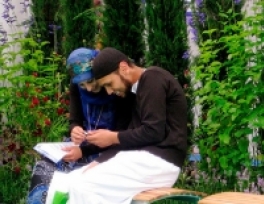Answer
Salam Dear Brother,
Thank you for your question and for contacting Ask About Islam.
May Allah reward you for seeking Islamic knowledge and attempting to clear your misconceptions about Islam.
The Quran came for all times, all cultures, and all levels of intellect, so different interpretations allow different options for different people at different times. This makes the Quran diverse without losing the core meaning.
For example, the main purpose of the dress code for women is to express modesty so the society is protected from improper behavior against women. Therefore, there are general guidelines, but how different women apply them, could differ depending on many factors; one of them is culture.
Your statement about promising soldiers gardens, rivers, and pure women is partially correct, since the Quran does not promise pure women specifically to soldiers. However, the following verses mention that their reward will be the paradise, which includes gardens and rivers. The translation is as follows:
{So their Lord accepted of them (their supplication and answered them), “Never will I allow to be lost the work of any of you, be it male or female. You are (members) one of another, so those who emigrated and were driven out from their homes, and suffered harm in My Cause, and who fought, and were killed (in My Cause), verily, I will expiate from them their evil deeds and admit them into gardens under which rivers flow (in Paradise); a reward from Allah, and with Allah is the best of rewards.} (Al-Imran, Chapter 3, Verse 195)
{Indeed Allah has purchased from the believers their persons and their wealth, in return has promised them paradise; they fight in the cause of Allah and slay and are slain. This is a true promise which is binding on Him mentioned in the Torah, the Gospel, and the Quran; and who is truer in fulfilling his promise than Allah? Rejoice, therefore, in the bargain which you have made, and that is a mighty achievement.} (Al-Tawbah, Chapter 9, Verse 111)
Notice that such a promise is for both male and female and is also mentioned in the Torah and the Gospel; so it is not specific to the Quran. Also the promise for the Paradise is mentioned in the Quran for those who are righteous:
{And give glad tidings to those who believe and do righteous good deeds that for them will be gardens under which rivers flow (Paradise…)} (Al-Baqara, Chaper 2, Verse 25)
{Say: “Shall I inform you of things far better than those? For the pious there are gardens (Paradise) with their Lord, underneath which rivers flow. Therein (there is) eternal (home) and purified mates or wives. And Allah will be pleased with them. And Allah is All-Seer of the (His) slaves} (Al-Imran, Chapter 3, Verse 15)
Muslims may only marry men or women from their own faith with the exception of Muslim men who are allowed to marry chaste Christian or Jewish women according to verse five in Surah Al-Maidah, chapter five; which is an exception based on specific rules, not a contradiction.
Muslims address Christians and Jews as People of the Book, which means that they hold a special status in our religion, because their traditions are based on divine teachings from prophet Jesus and Moses (peace be upon them), even if it has been altered.
As for the head cover, it is mentioned in verse 31 of Surah An-Nur, chapter 24 and verse 59 of Surah Al-Ahzab, chapter 33. In the first verse, it is mentioned explicitly using the word khimar in Arabic, meaning head cover; while in the second verse, it mentions the Arabic word Jalabibihinna which is the plural of Jilbab. Ibn Taymiyyah stated in Majmu Al-Fatawa 22:110-111:
“The jilbab is a cover which is large enough to cover the woman’s head and the rest of her body hanging from the top of her head.”
According to most contemporary scholars this is known as Abaya; this could be with or without head cover; meaning wearing it separately with a proper head cover that covers the chest area. Allah has mentioned the Jilbab in this verse not to specifically enforce wearing it rather to convey covering the entire body including the head, since Allah has mentioned the head cover in another verse, khimar.
The permissibility of exposing the face and hands is based on the Quranic verse, which is translated as follows:
{And say to the believing women that they cast down their looks and guard their private parts and do not display their ornaments except what appears thereof…} (An-Nur, Chapter 24, Verse 31)
“Except what appears thereof” means the face and the hands as confirmed by the Prophet’s hadiths (peace be upon him):
“A woman in ihram is not to cover her face nor wear gloves.” (Al-Bukhari)
This means that the Prophet (peace be upon him) has forbidden the covering of the face during Umrah or pilgrimage and explicitly mentions that the face and the hands can be exposed. Imam Abu Hanifa was of the opinion that the feet up to the ankles can also be exposed since hands are more attractive than feet.
On the other hand, As-Salmani, one of the successors, is of the opinion that a woman should cover her face with her Jilbab by drawing it over her face leaving her left eye to see from, and according to Aisha’s narration, she did so when men passed by; therefore not a permanent face cover or niqab.
A woman may cover her face if she wishes to do so, but that does not mean she gets more reward, nor her reward is diminished compared to the one who does not, since reward in Islam is based on following Allah’s commands as shown by His Prophet (peace be upon him), and the person’s intention.
In brief, translators of Quran may not convey the proper meaning of a specific verse, that’s why we have to depend on Quran interpreters, who may explain a verse from another Quranic verse or from hadith, giving us a more complete connotation.
Finally, addressing your question about choosing a wife, this depends on what you are looking for. The young lady you have mentioned might not be a good partner for you, but she might be the best for someone else.
Islam gives you the right to see your future partner before marriage, since couples need to look satisfying for each other, not for someone else.
I advise you to take your time when choosing a life partner; your choice is out there somewhere, you just have to look a bit harder. Also, you need to seek Allah’s guidance by praying the Istikhara prayer before making such an important decision.
Also, inform your family that it would be unfair to the girl to marry you, since your ways are complete opposites and you are afraid that this will not turn into a healthy marriage. What your mother likes might not necessarily match what you like; it is you who is getting married after all.
I hope this helps answer your question.
Salam and please keep in touch.
